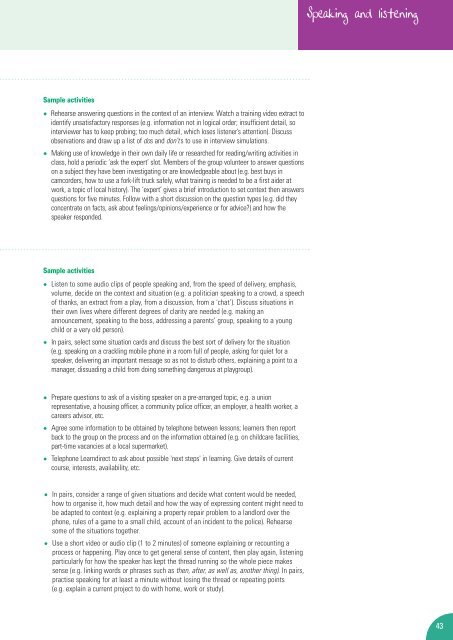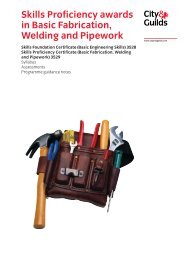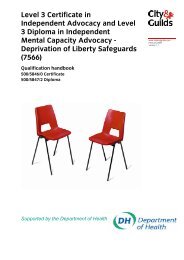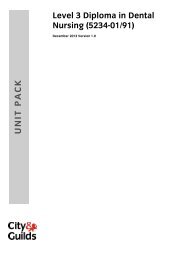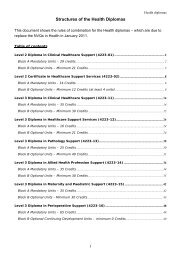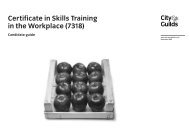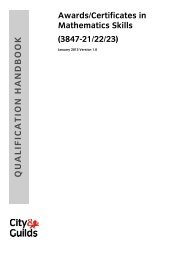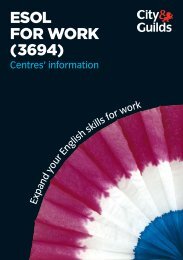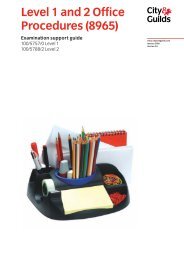Adult Literacy Core Curriculum - Nationally developed Skills for Life ...
Adult Literacy Core Curriculum - Nationally developed Skills for Life ...
Adult Literacy Core Curriculum - Nationally developed Skills for Life ...
You also want an ePaper? Increase the reach of your titles
YUMPU automatically turns print PDFs into web optimized ePapers that Google loves.
Sample activities<br />
• Rehearse answering questions in the context of an interview. Watch a training video extract to<br />
identify unsatisfactory responses (e.g. in<strong>for</strong>mation not in logical order; insufficient detail, so<br />
interviewer has to keep probing; too much detail, which loses listener’s attention). Discuss<br />
observations and draw up a list of dos and don’t s to use in interview simulations.<br />
• Making use of knowledge in their own daily life or researched <strong>for</strong> reading/writing activities in<br />
class, hold a periodic ‘ask the expert’ slot. Members of the group volunteer to answer questions<br />
on a subject they have been investigating or are knowledgeable about (e.g. best buys in<br />
camcorders, how to use a <strong>for</strong>k-lift truck safely, what training is needed to be a first aider at<br />
work, a topic of local history). The ‘expert’ gives a brief introduction to set context then answers<br />
questions <strong>for</strong> five minutes. Follow with a short discussion on the question types (e.g. did they<br />
concentrate on facts, ask about feelings/opinions/experience or <strong>for</strong> advice?) and how the<br />
speaker responded.<br />
Sample activities<br />
• Listen to some audio clips of people speaking and, from the speed of delivery, emphasis,<br />
volume, decide on the context and situation (e.g. a politician speaking to a crowd, a speech<br />
of thanks, an extract from a play, from a discussion, from a ‘chat’). Discuss situations in<br />
their own lives where different degrees of clarity are needed (e.g. making an<br />
announcement, speaking to the boss, addressing a parents’ group, speaking to a young<br />
child or a very old person).<br />
• In pairs, select some situation cards and discuss the best sort of delivery <strong>for</strong> the situation<br />
(e.g. speaking on a crackling mobile phone in a room full of people, asking <strong>for</strong> quiet <strong>for</strong> a<br />
speaker, delivering an important message so as not to disturb others, explaining a point to a<br />
manager, dissuading a child from doing something dangerous at playgroup).<br />
• Prepare questions to ask of a visiting speaker on a pre-arranged topic, e.g. a union<br />
representative, a housing officer, a community police officer, an employer, a health worker, a<br />
careers advisor, etc.<br />
• Agree some in<strong>for</strong>mation to be obtained by telephone between lessons; learners then report<br />
back to the group on the process and on the in<strong>for</strong>mation obtained (e.g. on childcare facilities,<br />
part-time vacancies at a local supermarket).<br />
• Telephone Learndirect to ask about possible 'next steps' in learning. Give details of current<br />
course, interests, availability, etc.<br />
• In pairs, consider a range of given situations and decide what content would be needed,<br />
how to organise it, how much detail and how the way of expressing content might need to<br />
be adapted to context (e.g. explaining a property repair problem to a landlord over the<br />
phone, rules of a game to a small child, account of an incident to the police). Rehearse<br />
some of the situations together.<br />
• Use a short video or audio clip (1 to 2 minutes) of someone explaining or recounting a<br />
process or happening. Play once to get general sense of content, then play again, listening<br />
particularly <strong>for</strong> how the speaker has kept the thread running so the whole piece makes<br />
sense (e.g. linking words or phrases such as then, after, as well as, another thing). In pairs,<br />
practise speaking <strong>for</strong> at least a minute without losing the thread or repeating points<br />
(e.g. explain a current project to do with home, work or study).<br />
Speaking and listening<br />
43


